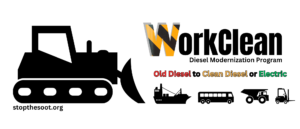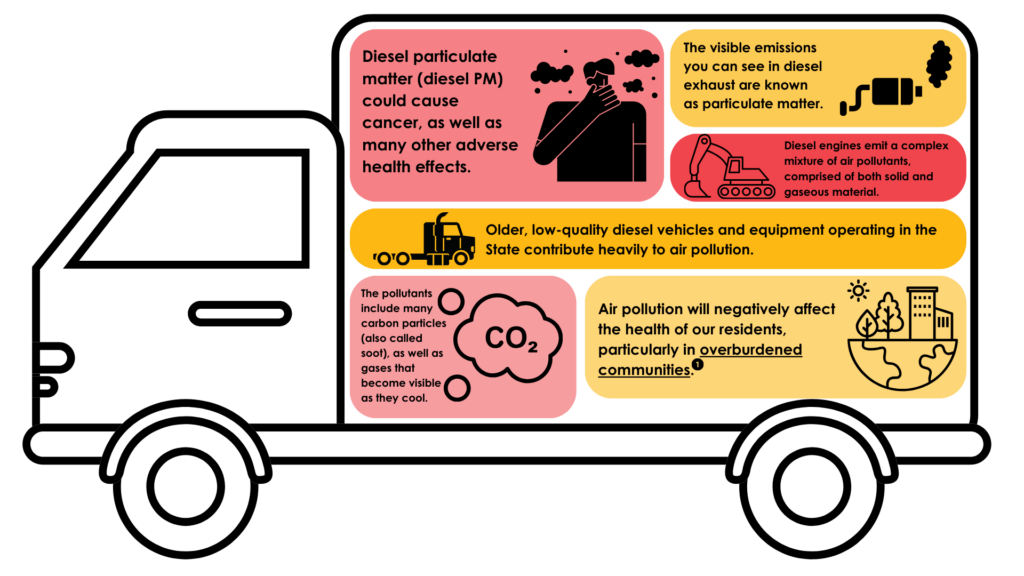
WorkClean: Diesel Modernization Program
The Bureau of Mobile Sources’ Diesel Modernization Program is primarily a diesel replacement program. This program utilizes Federal and State funding to replace on-road and non-road diesel equipment/vehicles and repower marine engines – anything from refuse trucks to forklifts to ferry vessels. The program periodically solicits specific project proposals in addition to accepting project proposals on a rolling basis, with awards contingent upon available funding.
Check out this page as your one-stop-shop for all things to get your Diesel Modernization Program (DMP) project moving.
State Program Summaries
Successful Project Highlights
Marine Vessel Engine Repower

Non-Road Diesel Equipment Replacements

On-Road Vehicle Electrification

The Diesel Modernization Program utilizes various funding sources and has awarded grants for a variety of transportation projects since 2014. This dashboard highlights the success of the program for the last decade.
Funding Sources
- The Congestion Mitigation and Air Quality Improvement (CMAQ) program provides funding to both state and local governments for transportation projects to help meet the requirements of the Clean Air Act. Funded by the Federal Highway Association (FHWA), the program aims to reduce traffic congestion and improve air quality for areas that do not meet the National Ambient Air Quality Standards for ozone, carbon monoxide, or particulate matter. Currently, funding has been awarded to the North Jersey Transportation Planning Authority (NJTPA) for projects in Northern/Central New Jersey Counties (Sussex, Somerset, Morris, Bergen, Essex, Hudson, Hunterdon, Middlesex, Monmouth, Ocean, Passaic, Union, Warren).
- As of September 2023, the Diesel Modernization Program (DMP) has funded 18 non-road diesel replacement projects using CMAQ funding. The awards for these projects total over 2.7 million in funding. Visit our Non-Road Funding Successes(link) page for successful projects funded by CMAQ.
- The Diesel Emissions Reduction Act (DERA) is a program provided by the U.S. Environmental Protection Agency (EPA) that aims to protect human health and improve air quality by reducing harmful emissions from diesel engines. Through annual grants and rebates, state and tribal agencies can apply and receive awards to redistribute to their local projects. DERA also provides competitive awards that are not annually guaranteed, but states may apply for. For each annual award, DEP selects a specific project type to be funded, our current availabilities are listed below.
- DERA funding is currently available for non-road vehicle replacements, marine engine replacements and eTRU replacements only. This includes vehicles without highway license plates and often used for construction, such as: handling of cargo (including at a port or airport); agriculture; and mining.
- As of September 2023, The Diesel Modernization Program (DMP) has funded over 13 projects using DERA funding. Their awards total over $800,000.
- The Regional Greenhouse Gas Initiative (RGGI) is a multi-state, market-based program that establishes a regional cap on carbon dioxide (CO2) emissions and requires fossil fuel power plants with a capacity greater than 25 megawatts (MW) to obtain an allowance for each ton of CO2 emitted annually.
- RGGI is a cooperative effort among 11 states: Connecticut, Delaware, Maine, Maryland, Massachusetts, New Hampshire, New Jersey, New York, Pennsylvania, Rhode Island, and Vermont – to reduce greenhouse gas emissions. Launched in 2005, RGGI was the first mandatory greenhouse gas “cap-and-invest” program in the United States.
- The NJ DEP WorkClean: Diesel Modernization Program has received six (6) rounds of RGGI funding with the seventh (7th) round arriving soon. To date, over 150 million dollars of RGGI proceeds have been used for various diesel modernization projects such as electrifying school buses, transit buses, garbage trucks, shuttle buses, car sharing services, and heavy-duty refuse trucks!
- In September of 2015, Volkswagen was forced to publicly admit it had secretly installed a “defeat device”—software designed to cheat emissions testing and deceive federal and state regulators—in most of their Volkswagen- and Audi-branded turbocharged direct injection (“TDI”) diesel engine vehicles. Lawsuits quickly followed, and one of these lawsuits is an action brought by the United States Department of Justice (“United States”) on behalf of the U.S. Environmental Protection Agency (“EPA”) for violations of the Clean Air Act, 42 U.S.C. § 7401 et seq.
- After the settlement and in 2018, NJDEP was awarded $70M to be spent over time as part of the “Volkswagen Mitigation Consent Decree”. Governor Phil Murphy prioritized the funding for 11 on-road electrification projects totaling $24 million, including $8 million for 8 electric transit buses with New Jersey Transit.
- In 2021, NJDEP announced its second round of Volkswagen projects, which encompassed $33 million for 28 on-road electrification projects, including airport ground support equipment, electric garbage trucks, and electric buses.
